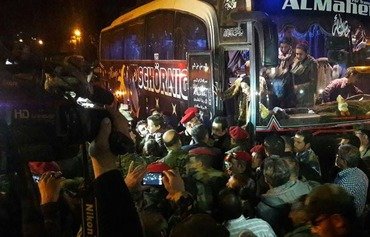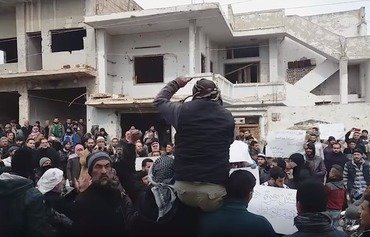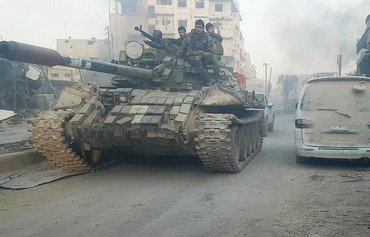Syrian opposition groups and civilians in Homs and Hama provinces this week staged a series of protests over the terms of a ceasefire and reconciliation agreement with the regime, a local activist said.
Residents perceived the terms of the agreement -- presented by regime ally Russia and similar in content to agreements struck in other parts of Syria -- as humiliating, media activist Faisal al-Ahmad told Diyaruna.
"As soon as residents learned the terms of the agreement, they rejected it en masse, staging demonstrations in most villages and towns in the region," he said.
Protests began Tuesday evening (May 1st) and continued through Wednesday, and were most in evidence in al-Ghantu, al-Houla, al-Rastan, Talbiseh, Tal Zahab and al-Dar al-Kabira, he said.
The agreement carried a direct threat, al-Ahmad said: Hand over all heavy weapons by noon Wednesday, or become the target of military operations.
The agreement also did not provide guarantees for the safety of the opposition fighters and those who wish to leave the region for Idlib province and the Aleppo town of Jarablus unless the fate of detainees in opposition prisons was revealed.
Terms of the agreement
The terms of the agreement include the handover of heavy weapons by noon Wednesday and the departure of militants and civilians who wish to leave to Jarablus and Idlib over a period extending through July, al-Ahmad said.
The departure of extremist alliance Tahrir al-Sham was contingent on its revealing the fate of 200 residents detained in its prisons, and militants in al-Houla area were likewise required to reveal the fate of detainees from al-Aqrab.
"The agreement explicitly stipulates that the safety of departing opposition elements would not be guaranteed until the fate of the detainees is revealed," al-Ahmad said.
It also stipulates the entry of the Syrian army into the region, and paves the way for government employees and army officers who had defected to return to their work.
A grace period of six months was extended to those who have failed to report for compulsory military duty in the Syrian army.

![Displaced residents of the city of al-Rastan in Idlib take part in a protest to express their rejection of a reconciliation agreement with the regime. [Photo courtesy of Faisal al-Ahmad]](/cnmi_di/images/2018/05/03/12528-Idlib-protest-regime-600_384.jpg)






